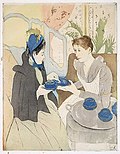Tea party
Tea Party refers to a social gathering where tea is served, often accompanied by light refreshments. Originating in Britain during the early 19th century, the tradition has since spread worldwide and has been adapted to various cultural contexts.
History[edit]
The tradition of the tea party began in Britain during the early 19th century. The concept was introduced by Anna, the Duchess of Bedford, who started the trend of having tea with light refreshments in the afternoon to stave off hunger before dinner. This practice quickly gained popularity among the British upper class and eventually became a social event known as the "afternoon tea" or "tea party".
Types of Tea Parties[edit]
There are several types of tea parties, each with its own unique characteristics and traditions.
Afternoon Tea[edit]
Afternoon tea, also known as "low tea", is a British tradition that involves serving tea with a variety of small sandwiches, scones, and pastries. It is typically served in the late afternoon and is often associated with social events or special occasions.
High Tea[edit]
High tea, contrary to its name, is a more substantial meal that is served in the early evening. It includes tea, but also heavier dishes like meat, fish, and baked goods. Despite its name, high tea is considered less formal than afternoon tea.
Cream Tea[edit]
Cream tea is a type of afternoon tea that is popular in the West Country of England. It involves serving tea with scones, clotted cream, and strawberry jam.
Cultural Variations[edit]
Tea parties vary greatly depending on the cultural context in which they are held. For example, in Japan, the Japanese tea ceremony is a formal and ritualized event that involves the ceremonial preparation and presentation of matcha, a powdered green tea. In Russia, tea parties often involve samovars, large urns used to boil water and brew tea.
Tea Party in Popular Culture[edit]
The tea party has been a popular theme in various forms of media, most notably in literature. The most famous example is the Mad Hatter's tea party in Lewis Carroll's Alice's Adventures in Wonderland.
See Also[edit]
- Tea_party
-
Afternoon Tea Party by Mary Cassatt
-
A Group of Artists by Grün
-
Tea Time
-
Tea Party
Ad. Transform your life with W8MD's Budget GLP-1 injections from $49.99


W8MD offers a medical weight loss program to lose weight in Philadelphia. Our physician-supervised medical weight loss provides:
- Weight loss injections in NYC (generic and brand names):
- Zepbound / Mounjaro, Wegovy / Ozempic, Saxenda
- Most insurances accepted or discounted self-pay rates. We will obtain insurance prior authorizations if needed.
- Generic GLP1 weight loss injections from $49.99 for the starting dose of Semaglutide and $65.00 for Tirzepatide.
- Also offer prescription weight loss medications including Phentermine, Qsymia, Diethylpropion, Contrave etc.
NYC weight loss doctor appointmentsNYC weight loss doctor appointments
Start your NYC weight loss journey today at our NYC medical weight loss and Philadelphia medical weight loss clinics.
- Call 718-946-5500 to lose weight in NYC or for medical weight loss in Philadelphia 215-676-2334.
- Tags:NYC medical weight loss, Philadelphia lose weight Zepbound NYC, Budget GLP1 weight loss injections, Wegovy Philadelphia, Wegovy NYC, Philadelphia medical weight loss, Brookly weight loss and Wegovy NYC
|
WikiMD's Wellness Encyclopedia |
| Let Food Be Thy Medicine Medicine Thy Food - Hippocrates |
Medical Disclaimer: WikiMD is not a substitute for professional medical advice. The information on WikiMD is provided as an information resource only, may be incorrect, outdated or misleading, and is not to be used or relied on for any diagnostic or treatment purposes. Please consult your health care provider before making any healthcare decisions or for guidance about a specific medical condition. WikiMD expressly disclaims responsibility, and shall have no liability, for any damages, loss, injury, or liability whatsoever suffered as a result of your reliance on the information contained in this site. By visiting this site you agree to the foregoing terms and conditions, which may from time to time be changed or supplemented by WikiMD. If you do not agree to the foregoing terms and conditions, you should not enter or use this site. See full disclaimer.
Credits:Most images are courtesy of Wikimedia commons, and templates, categories Wikipedia, licensed under CC BY SA or similar.
Translate this page: - East Asian
中文,
日本,
한국어,
South Asian
हिन्दी,
தமிழ்,
తెలుగు,
Urdu,
ಕನ್ನಡ,
Southeast Asian
Indonesian,
Vietnamese,
Thai,
မြန်မာဘာသာ,
বাংলা
European
español,
Deutsch,
français,
Greek,
português do Brasil,
polski,
română,
русский,
Nederlands,
norsk,
svenska,
suomi,
Italian
Middle Eastern & African
عربى,
Turkish,
Persian,
Hebrew,
Afrikaans,
isiZulu,
Kiswahili,
Other
Bulgarian,
Hungarian,
Czech,
Swedish,
മലയാളം,
मराठी,
ਪੰਜਾਬੀ,
ગુજરાતી,
Portuguese,
Ukrainian


